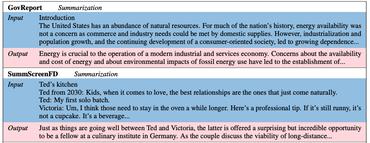Search Results for author: Ziyu Liu
Found 13 papers, 9 papers with code
RAR: Retrieving And Ranking Augmented MLLMs for Visual Recognition
1 code implementation • 20 Mar 2024 • Ziyu Liu, Zeyi Sun, Yuhang Zang, Wei Li, Pan Zhang, Xiaoyi Dong, Yuanjun Xiong, Dahua Lin, Jiaqi Wang
Notably, our approach demonstrates a significant improvement in performance on 5 fine-grained visual recognition benchmarks, 11 few-shot image recognition datasets, and the 2 object detection datasets under the zero-shot recognition setting.
Self-Supervised Learning for Time Series: Contrastive or Generative?
1 code implementation • 14 Mar 2024 • Ziyu Liu, Azadeh Alavi, Minyi Li, Xiang Zhang
In this paper, we will present a comprehensive comparative study between contrastive and generative methods in time series.
Introducing Shape Prior Module in Diffusion Model for Medical Image Segmentation
no code implementations • 12 Sep 2023 • Zhiqing Zhang, Guojia Fan, Tianyong Liu, Nan Li, Yuyang Liu, Ziyu Liu, Canwei Dong, Shoujun Zhou
Furthermore, to capture specific anatomical a priori information in medical images, we incorporate a shape a priori module.
Motley: Benchmarking Heterogeneity and Personalization in Federated Learning
2 code implementations • 18 Jun 2022 • Shanshan Wu, Tian Li, Zachary Charles, Yu Xiao, Ziyu Liu, Zheng Xu, Virginia Smith
To better answer these questions, we propose Motley, a benchmark for personalized federated learning.
On Privacy and Personalization in Cross-Silo Federated Learning
1 code implementation • 16 Jun 2022 • Ziyu Liu, Shengyuan Hu, Zhiwei Steven Wu, Virginia Smith
While the application of differential privacy (DP) has been well-studied in cross-device federated learning (FL), there is a lack of work considering DP and its implications for cross-silo FL, a setting characterized by a limited number of clients each containing many data subjects.
The Skellam Mechanism for Differentially Private Federated Learning
1 code implementation • NeurIPS 2021 • Naman Agarwal, Peter Kairouz, Ziyu Liu
We introduce the multi-dimensional Skellam mechanism, a discrete differential privacy mechanism based on the difference of two independent Poisson random variables.
ECG-Based Heart Arrhythmia Diagnosis Through Attentional Convolutional Neural Networks
1 code implementation • 18 Aug 2021 • Ziyu Liu, Xiang Zhang
Electrocardiography (ECG) signal is a highly applied measurement for individual heart condition, and much effort have been endeavored towards automatic heart arrhythmia diagnosis based on machine learning.
The Distributed Discrete Gaussian Mechanism for Federated Learning with Secure Aggregation
1 code implementation • 12 Feb 2021 • Peter Kairouz, Ziyu Liu, Thomas Steinke
To ensure privacy, we add on-device noise and use secure aggregation so that only the noisy sum is revealed to the server.
Learning Implicit Credit Assignment for Cooperative Multi-Agent Reinforcement Learning
1 code implementation • NeurIPS 2020 • Meng Zhou, Ziyu Liu, Pengwei Sui, Yixuan Li, Yuk Ying Chung
We present a multi-agent actor-critic method that aims to implicitly address the credit assignment problem under fully cooperative settings.
TLPG-Tracker: Joint Learning of Target Localization and Proposal Generation for Visual Tracking.
no code implementations • International Joint Conference on Artificial Intelligence 2020 • Siyuan Li, Zhi Zhang, Ziyu Liu, Anna Wang, Linglong Qiu, Feng Du
Target localization and proposal generation are two essential subtasks in generic visual tracking, and it is a challenge to address both the two efficiently.
Disentangling and Unifying Graph Convolutions for Skeleton-Based Action Recognition
4 code implementations • CVPR 2020 • Ziyu Liu, Hongwen Zhang, Zhenghao Chen, Zhiyong Wang, Wanli Ouyang
Spatial-temporal graphs have been widely used by skeleton-based action recognition algorithms to model human action dynamics.
 Ranked #4 on
3D Action Recognition
on Assembly101
Ranked #4 on
3D Action Recognition
on Assembly101
LightMC: A Dynamic and Efficient Multiclass Decomposition Algorithm
no code implementations • 25 Aug 2019 • Ziyu Liu, Guolin Ke, Jiang Bian, Tie-Yan Liu
Instead of using fixed coding matrix and decoding strategy, LightMC uses a differentiable decoding strategy, which enables it to dynamically optimize the coding matrix and decoding strategy, toward increasing the overall accuracy of multiclass classification, via back propagation jointly with the training of base learners in an iterative way.
Towards Understanding Chinese Checkers with Heuristics, Monte Carlo Tree Search, and Deep Reinforcement Learning
no code implementations • 5 Mar 2019 • Ziyu Liu, Meng Zhou, Weiqing Cao, Qiang Qu, Henry Wing Fung Yeung, Vera Yuk Ying Chung
The game of Chinese Checkers is a challenging traditional board game of perfect information that differs from other traditional games in two main aspects: first, unlike Chess, all checkers remain indefinitely in the game and hence the branching factor of the search tree does not decrease as the game progresses; second, unlike Go, there are also no upper bounds on the depth of the search tree since repetitions and backward movements are allowed.









